By Manuel “Bobby” M. Orig, Director, ApoAgua
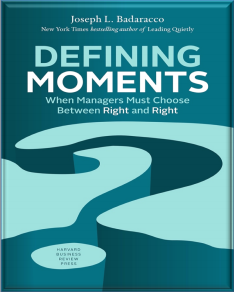
Author, Joseph L. Badarraco, Jr.
Professor Badaracco is a member of the Harvard Business School’s General Management Area and had taught courses on strategy, general management, and business ethics. He had written several books on leadership, decision-making and responsibility. These include Defining Moments, Leading Quietly, and Questions of Character. These books have been translated into ten languages.
Thoughtful managers sometimes face business problems that raise difficult, deeply personal questions. In these situations, managers find themselves wondering: Do I have to leave some of my values at home when I go to work? How much of myself – and of what I really care about – do I have to sacrifice to get ahead? When I get to the office, who am I?
Difficult questions like these are often matters of right versus right, not right versus wrong. Sometimes, a manager faces a difficult problem and must choose between two ways of resolving it. Each alternative is the right thing to do, but there is no way to do both. For managers who struggle with these kinds of situations, the stakes are very high. They go to the heart of what it means to be a successful manager and a decent, responsible person.
Praise from William McLennan, University Chaplain, Tufts University:
Finally, here’s a book that helps us prioritize our personal and institutional loyalties and responsibilities in decision making, wend our way through real-life moral mazes, and develop our character in the process. A crystal clear, practical writer, Badaracco provides a new and unorthodox approach to issues of great complexity. He offers pragmatic assistance to real people weighing conflicting duties, ends, and virtues of business life.
INTRODUCTION
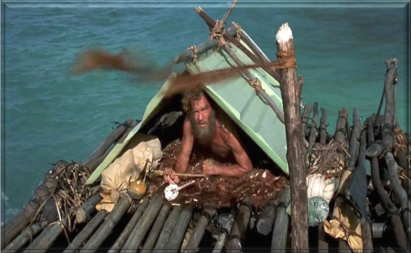
Several years ago, the author listened closely as a promising young manager at a well-known consumer products company described a difficult conflict between her responsibilities at work and her personal values. Later, after the issue was resolved, she drew several lessons from her experience, and one of them has stuck in the author’s mind:
It was a wake-up call in a lot of ways – definitely on how organizations work. You can get stranded alone. You alone are responsible, for your personal and professional development.
This statement is both realistic and distressing. Managers do get stranded. The experience can be painful and difficult. But when it happens, are they entirely alone? Where can they turn for guidance on the moral dilemmas of management?
Several standard answers were available – follow the law, serve the shareholders, consult the company credo, serve all the stakeholders, do the right thing – but these have limited practical value. Each of the standard answers contains an important element of truth, but all of them are abstract and very general. They float serenely above the messy, complicated, anxiety-laden, political dilemmas that managers must sometimes resolve, typically with too little time and information.
What managers value is guidance with traction, guidance that directly engages and illuminates problems – as they actually experience these problems. The author have now come to believe, after listening to hundreds of managers discuss difficult decisions of personal and professional responsibility, that the most useful guidance involves asking questions, not giving answers.
The author’s search for the right answers led to the writing of this book. He found that the most challenging, penetrating, and practical answers fused elements from an unusual range of sources. These include detailed case studies of business managers and enduring works of literature.
At the heart of this book is a framework of questions drawn from these disparate sources. It is intended to provoke and to challenge: to elicit answers, not announce them. Above all, it is designed to help managers avoid the hazards of being “stranded alone” – by helping them frame thoughtful, practical, personally meaningful ways of resolving the inescapable dilemmas of life and work.
DIRTY HANDS
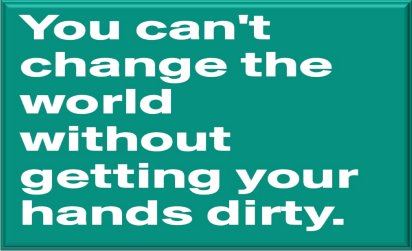
Thoughtful managers sometimes face business problems that raise difficult, deeply personal questions. In these situations, managers find themselves wondering: Do I have to leave some of my values at home when I go to work? How much of myself – and of what I really care about – do I have to sacrifice to get ahead? When I get to the office, who am I?
Difficult questions like these are often matters of right versus right, not right versus wrong. Sometimes, a manager faces a difficult problem and must choose between two ways of resolving it. Each alternative is the right thing to do, but there is no way to do both.
Consider, for example, the problem faced by Rebecca Dennet, a branch manager for a major bank. Her boss, a senior executive, told her that her branch would be shut down in two months. The executive asked Dennet to keep the information confidential because important regulatory papers had yet to be filed, and she agreed to do so.
Two days later, a coworker asked Dennet if she knew anything about the rumor that the branch would soon be closed. When she hesitated, the coworker grew impatient and said, “Look, this is serious. There aren’t a lot of jobs around here. Do you know anything?”
What should Dennet have done? The right thing, of course, was to answer the question honestly – after all, she did know something. It is also right to be loyal to friends, and the woman asking for help and guidance was a good friend. But saying nothing was also right. As a corporate officer, Dennet’s duty was to maintain confidentiality, and she had explicitly promised to do so. Clearly, her choice was not between right and wrong, but between right and right.
Dennet’s problem is hardly unique. Although details differ, good managers often struggle with some version of this predicament. They want to live up to their personal standards and values, they have to meet the expectations of customers and shareholders – often in the face of relentless profit pressures – and their own jobs are the foundation of their families’ security. Most managers also want to be fair to the people who work for them, lend a hand to people in need, earn the respect of their families and friends, and maintain their personal integrity.
Most of the time, managers find ways to juggle these responsibilities and aspirations. In some cases, however, they cannot. Then these responsible, successful, achievement-oriented people face the prospect of a serious kind of personal failure: the failure to live up to the commitments they have made and the standards by which they want to live. For managers who struggle with these kinds of situations, the stakes are very high. They go to the heart of what it means to be a successful manager and a decent, responsible person.
CRUCIBLES OF CHARACTER
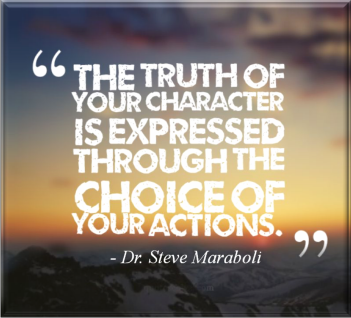
Situations like Rebecca Dennet’s are sometimes called “dirty hands” problems. This name comes from the title of a play by the French philosopher Jean Paul Satre. The story takes place in wartime. Its main characters include the veteran of an underground unit of the Communist Party and a zealous young party member. At a crucial moment in the drama, the young man accuses his leader of betraying the party’s ideals, through the compromises he has made with reactionary political forces.
The old man answers this harsh accusation in the following words:
How do you cling to your purity, young man! How afraid are you to soil your hands! All right, stay pure! What good will it do? Purity is an idea for a yogi or monk…To do nothing, to remain motionless, arms at your side, wearing kid gloves. Well, I have dirty hands. Right up to the elbows. I plunged them in filth and blood. But what do you hope? Do you think you can govern innocently?
Do you think you can govern innocently? This is a powerful, haunting question. The old Communist suggests that men and women who have power over the lives and livelihoods of others must almost inevitably get their hands dirty – in the sense of losing their moral innocence.
For Rebecca Dennet and other managers, the question is: Do you think you can manage innocently? The veteran party leader poses the question in a way that reveals his answer. Only the naïve, he believes, can avoid dirty hands. But is this so? Are dirty hands really the inevitable lot of successful men and women with real power and responsibility in life?
Consider the reflections of Chester Barnard. Barnard was among this century’s most insightful observers of business leaders. He combined an incisive mind with years of hands-on management experience to write The Functions of the Executive, a classic of management literature.
Barnard discusses managers’ responsibilities at length. He makes an observation as remarkable and disturbing as the old Communist’s. Barnard warns, “It seems to me inevitable that the struggle to maintain cooperation among men should as surely destroy some men morally as battle destroys them physically.”
This passage is remarkable as much for Bernard’s realism as for the strength of his convictions. For Barnard, management is not the upbeat adventure described in many management books. It is the “struggle” to get people to work together. Moreover, he views his troubling conclusion as a dead certainty, calling it “inevitable.”
Even more striking is the similarity between Barnard’s conclusion and the view that Sartre expresses through the old communist. Both men believed that positions of leadership impose difficult personal challenges that can destroy some men and women and strengthen others. For Barnard, leadership brings risk of moral destruction. For Sartre, it raises the prospect of “dirty hands.” Both men believed, in essence, that positions of leadership are crucibles of character.
The other part of the answer is best understood by looking at the origins of dilemmas like Rebecca Dennet’s. Positions of power carry complicated responsibilities. On some occasions, these responsibilities conflict with each other. At other times, they conflict with a manager’s personal values. All of these responsibilities, personal and professional, have strong moral claims, but often there is no way for the manager to meet every claim. These are NOT the ethical issues of right and wrong. They ARE conflicts of right versus right.
Neither Barnard nor Sartre believed that right-versus-right conflicts were purely intellectual issues. They knew that the choices between right and right are fraught with personal risk. In these cases, when managers do one thing right, they leave other right things undone. They feel they are letting others down and failing to leave up to their standards. The loss of innocence seems real and their hands feel dirty.
Right-versus-right conflicts becomes questions about life and not just about management for another reason: their finality. Once Rebecca Dennet makes a decision and implements it, there will be no turning back. She will have written a paragraph of her personal and professional autobiography. Her choices will be recorded in life’s permanent record.
Right-versus-right issues are troubling, complicated, and serious. They are also too important to ignore. Good people in management jobs sometimes make very hard choices. At issue is what it means to be a successful manager and a thoughtful, responsible human being.
BEYOND INSPIRATIONAL ETHICS

This book examines the right-versus-right conflicts that every business manager faces. It presents an unorthodox and pragmatic way to think about these conflicts and resolve them. For managers, right-versus right decisions are uniquely important choices. They can have powerful and often irrevocable consequences for the lives of the men and women who must make the decisions and for their organizations as well.
The approach presented here parts company with the standard inspirational answers to hard management problems. Most managers have heard speeches in which executives champion a corporate credo or mission
statement and exhort everyone to “Do the right thing.” These speeches serve a useful purpose. They are usually sincere.
But these inspirational approach offers little help with serious conflicts of responsibility. The truly difficult question is the one that Barnard and Sartre raise: What to do when one clear right thing must be left undone in order to do another or when doing the right thing requires doing something wrong?
This book argues that right-versus-right choices are best understood as defining moments. These are decisions with three basic characteristics: they reveal, they test, and they shape. In other words, a right-versus-right decision can reveal a manager’s basic values and, in some cases, those of an organization. At the same time, the decision tests the strength of the commitments that a person or an organization had made. Finally, the decision casts a shadow forward. It shapes the character of the person and, in some cases, the organization.
For managers, the urgent questions are: How do I think about defining moments? How do I resolve them in ways I can live with? This book offers practical advice for reflecting on right-versus-right conflicts and finding ways to resolve them. It provides a framework for thinking through these difficult decisions.
RIGHT VERSUS RIGHT
This book introduced the right-versus-right conflict through case studies that involved three central figures who must make important, life changing choices.
For this summary, we examined the first case study which involved Steve Lewis, “whose approach to analyzing the right-versus-right conflict that he faced and his resolution of the issue represent a win win situation that did not compromise his core value of being treated and judged based on his actions, not on his race.
The second case involved a manager who must make a decision whether to fire a female employee who is not keeping up on an important account and occasionally misses work due to her family obligations. Should he and his employer care deeply about sending this talented, hardworking single parent onto unemployment or should the bottom line of the company be the only guiding force in deciding her fate.
The third case involved the CEO of a pharmaceutical company that developed the abortion pill, RU 486. The question he must grapple with is, should his company sell the abortion pill or keep it off the market due to protests by anti-abortion groups and the potential for economically harmful boycotts of its other products.” (Herb Rubenstein’s review, Harvard Business School Press, 1997)
These three cases illustrate the basic types of right-versus-right dilemma. Managers urgently needed practical answers to difficult problems. They would have preferred simple answers, such as “Do the right thing.” But Barnard’s warning about the moral hazards of management life applied in most cases and managers faced the prospect of dirty hands.
CRISES OF MORAL IDENTITY
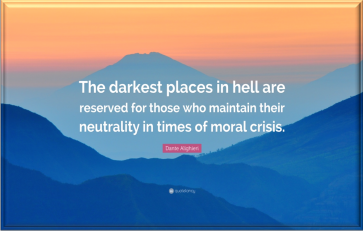
The first case involves the case of a young man, Steve Lewis, who had just completed his first year of work at a prestigious New York investment bank. Lewis was an analyst, which means that he spent days and many nights dissecting detailed financial data.
Early one Tuesday morning, Lewis found a message on his desk asking whether he could fly to St. Louis in two days to help with a presentation to an important prospective client. The message came as a surprise to him. Lewis’s firm had a clear policy against including analysts in presentations or client meetings, because they lack both experience and expertise. Lewis knew little about the subject of the St. Louis meeting, a specialized area of municipal finance. He was especially surprised that he had been selected over several more senior people in the public finance group.
Lewis immediately walked into the office of Andrew Webster, a friend and a partner at the firm. He showed Webster the note and asked, “Andy, what’s the deal here? Did you know I’ve been asked to go to the orals? Are you behind this?”
Webster interrupted him. “Let me tell you what’s happening, my friend. Look at you and me. What similarities are there? Let me tell you that the new state treasurer of Missouri is also black.” Webster continued, “Listen, the state treasurer wants me to see at least one black professional, or the firm has no chance of being named a manager of the deal. I’m used to these situations, but if you feel uncomfortable with it, maybe you don’t have to go. I could try to change my schedule and go instead of you.”
Lewis quickly replied, “No, no. Don’t do that. Let me just think it over. I’ll get back to you.” When Webster asked what the issue was, Lewis said he wasn’t sure there was one. He thanked Webster and headed back to his desk.
Lewis understood the issue; this was just one of countless occasions when he had tried to figure out whether he was being included in or excluded from because of his race. What Lewis did not understand was what to do. So he took a sheet of paper, drew a line down the middle, and began listing pros and cons.
The pros came quickly. “Opportunity” was the first thing Lewis wrote. A fourth-year associate told him, “The company is interested in making money. Either you’re on the team producing, or you’re not. That’s it.” By saying yes to the trip, Lewis would show he was a team player.
Opportunity also meant something else for Lewis. Both his parents had been strong supporters of civil rights. His mother spent two years suing her employer for discriminatory promotion practices. The lawsuit had been bitter and costly, but she had won. Lewis wondered if the St. Louis trip was not an opportunity to walk through the door his mother had helped pry open.
Lewis also wrote “Andy” on the list of pros. Although Andy volunteered to change his schedule, Lewis knew he could make Andy’s life easier by going to St. Louis. Lewis realized that Andy was one of the many people at the firm who had helped him out during the past year. The firm had treated him well, given him worthwhile assignments, and taught him more about the business than he thought anyone could learn in a year. In addition, the firm has paid him a salary that was much more than either of his parents earned.
Lewis next wrote down “Capitalism.” By attending the presentation, Lewis would serve the interests of the firm and its shareholders. Attending the presentation did involve dissembling, because Lewis contributed nothing to the project, yet Andy seemed to indicate that this sort of bluffing was within the rules of the game in the industry. Moreover, by sending Lewis, the firm was trying to serve the client’s interests.
The first thing he wrote on the list of negatives was “Phony.” Lewis was raised to tell the truth. He believed that the Golden Rule demanded honesty in his dealings with others. How, then, could he go to St. Louis and pretend to be a member of the deal team? This could be called “bluffing,” but that might be just a nice word for lying.
The next con Lewis made was “Malcolm X” – referring to an African American leader who condemned “house slaves.” They worked comfortably indoors, in return for telling their owners that they were fine and righteous masters – unlike the “field slaves” who had to toil under the hot sun, but with more of their dignity intact.
Now his firm was singling him out solely for his skin color, not for his talent. Lewis believed that companies and clients should base decisions on performance, competence, and character, not on games of mix and match based on race, gender, and religion. Was including him as a token black really all that different from excluding him because he was black?
Why was the St. Louis trip such a big deal? Did he have to think about everything as an African American? Couldn’t he simply do his job, like any other young manager who wanted a successful career doing work he liked?
Steve Lewis’s case illustrates a basic type of right-versus-right problem: an urgent, complicated, and sometimes painful issue of personal integrity and moral identity. These are problems that raise questions Who am I? And What is my moral center?
Notice that, as Lewis struggled with his problem, he defined himself in different ways. At different points in his thinking, he viewed himself as Andy’s friend and protégé, as an employee and agent of his firm’s shareholders, as a loyal and ambitious young investment banker, and as the son of parents he wanted to emulate. At some points, he was thinking of himself simply as a person; at others, as a Christian and African American. But each entailed, in his mind, particular loyalties and obligations. Each answer to the question Who am I? sketched a particular way for Lewis to make decisions and live his life. Unfortunately, some answers suggested that Lewis say yes to the trip; others required the answer no.
Lewis found his decision so difficult because he sensed that it involved more than the trip. It touched on the matter of who he was, what he stood for, and what regrets he would be willing to live with.
THE CHALLENGE
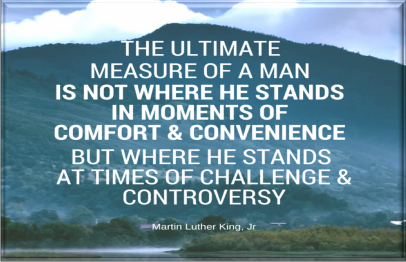
The challenge for Lewis, and for others facing questions like this, is not summoning the courage to do the right thing. The challenge is deciding which right thing to do. Lewis has to choose between right and right, on a complex issue of personal integrity. His question was not whether to be ethical; it was how to be ethical. His problem was the centrifugal pull of responsibilities to his employer, to its shareholders, to friends and his mentor, to himself, to his parents, and to his ideals.
It is tempting to dismiss Lewis’s dilemma as a special case or a minor episode. Perhaps the problem is mostly in Lewis’s head, so that what he really needs to do is make up his mind. Business calls for decisiveness. In practical terms, the consequences of his decision are small: if Lewis doesn’t go to St. Louis, Webster will.
Comments like these miss the essence of Lewis’s problem. Experience like Lewis’s shape how people view their careers and themselves. Most managers can look back on a few early-career events that had far-reaching effects on their view of themselves and their sense of how the world works. These experiences are etched in their memory.
An acute sense of vulnerability and uncertainty often intensified such recollections. As a young manager, Lewis is just beginning his effort to climb what British Prime Minister Benjamin Disraeli called “the greasy pole.” Lewis was now playing in the big leagues and just learning the rules of the game, and he did not want to make a naïve mistake.
In this type of right-versus-right dilemma, it is crucial to look beyond the immediate practical consequences of a decision and examine how a decision can shape managers’ views of obligations, their work, and their lives. Managers in these situations are like jugglers who are afraid to drop any of the balls they have in the air. Each is a part of themselves. Dropping one means failure, self-betrayal, feelings of regret and guilt – in a phrase, dirty hands.
BECOME WHO YOU ARE

Let’s examine the personal aspects of the task of revealing, testing, and shaping. It asks what considerations are most important and what guidance seems most useful. This is a complicated subject. The best place to begin the search for answers is a relatively simple right-versus-right problem, like the one Steve Lewis, the apprentice investment banker, had to resolve. Recall his dilemma. He was asked, on very short notice, to attend an important client presentation. Although saying yes would help his firm and his career, Lewis was reluctant to go. The proposed assignment was purely decorative: his role at the meeting was to serve as an African-American potted plant.
Lewis faced a defining moment. His decision would reveal something important about his character, values, and basic commitments in life. The situation would also test whatever values he had espoused in the past; he would now find out whether they were indeed his values or merely noble sentiments to which he had given lip service. Finally, his decisions and actions would shape his character, as well as his view of himself and the world – perhaps significantly. In essence, his choices would write a page of his moral autobiography.
What advice and counsel pragmatic moralists offer to managers in situations like these. It presents their guidance in the form of open-ended questions. Each of these includes a provocative phrase or refers to a thought provoking passage. None offers a precise principle, a definitive answer, or an item on a checklist.
UNDERSTANDING THE PERSONAL ASPECTS OF RIGHT-VERSUS-RIGHT PROBLEMS
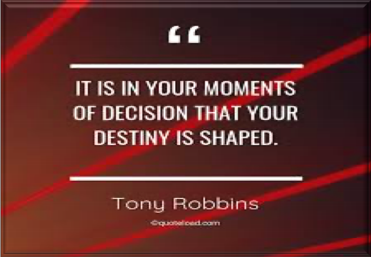
A valuable way of understanding the personal aspects of right-versus right problems originated from an unlikely source: the ideas of Friedrich Nietzsche. Nietzsche spent his entire career as a professor of classical literature; how could he have sound advice on real-world problems.
Nietzsche lived more than two millennia after Aristotle, a Greek, who was one of the greatest philosophers who ever lived. The two men differed on a multitude of topics, but on at least one important topic their thoughts converged. Both viewed critical personal decisions, such as defining moments, not as single, separate events, but rather as the most recent link in the long chain of a person’s past decisions, actions, and experiences. Nietzsche was particularly interested in another aspect of important decisions; they were also opportunities to forge the first link leading to a person’s future.
Nietzsche describes the crux of the task in his recommendation to “Become who you are!” At first, this advice may seem to bludgeon the obvious. Certainly, we need no effort to become ourselves, for that is what we are already. But Nietzsche had a clear agenda. He wanted his readers to pry themselves out of their familiar ways of thinking, avoid simplifying the complex, acknowledging that they are who they are, and yet remember the crucial, ongoing task of defining and refining their personalities and characters.
Nietzsche viewed people as artists. What they create are their lives and their selves. The past is the raw material with which they must work.
Nietzsche described a person’s past as a peculiar kind of raw material. A sculptor begins with a mass of soft clay that can be shaped into an endless variety of figures. Much of what a person works with is already formed and hardened. Some was shaped by other people, such as one’s parents. Some of the preformed material is pleasing, some is awkward, some is plain ugly. Hence, people need discipline, care, boldness, tenacity and single mindedness, courage, and imagination to have a real chance of shaping their characters and becoming who they are.
This task is vitally important – particularly in defining moments, when people do, in some degree, shape themselves. Nietzsche believed that people who ignore this task end up living lives designed by others or generic lives selected from the shelf of mass culture. To drive home his point, he calls these people “the herd.” He asks in effect: Why be a commodity? Why not create and live a life of your own?”
But how can Nietzsche’s advice be translated into practice? In the midst of a defining moment and a hard choice among conflicting responsibilities, what does it mean to “become who you are.”?
THE HEART’S REASONS

How do my feelings and intuitions define, for me, the right-versus right conflict? Answering this question is the first step in making use of the advice to become who you are. This step is a matter of asking just what the problem seems to be – not in objective terms that hold for everyone, but for a particular individual, with his or her own hopes and fears, values, and experiences. In short, the first question does not simply ask how you feel. It asks what your feelings tell you.
Steve Lewis was uncomfortable and anxious about the St. Louis presentation. But his instincts did more than sound an alarm; they also give an initial sense of what was at stake. Basically, Lewis felt that the St. Louis trip pitted self-respect against loyalty. Although he could think of many counterarguments and other ways of looking at the situation, this was what his intuition told him.
Lewis later recalled, “Almost every racial dilemma I had confronted involved the recognition of achievement rather than blatant rejection due to race.” His response to these situations was a personal philosophy that he summarized as “Action over words.” He had always taken advantage of the opportunities offered him, rather than stew over why he was offered them. He knew he had earned his opportunities, but instead of trying to explain this to others, his aim is to show them that he deserved the opportunities and would make the most of them.
In the past, however, Lewis knew he had earned the awards and was qualified to meet the challenges of the opportunities offered him. That did not seem to be the case now. The St. Louis “opportunity” was last-minute, he had not worked on the project, and his only role was to show up. “Action over words” did not seem to justify joining the presentation. At the same time, he wanted to be a team player and not disappoint his mentor, friends, and superiors.
Notice how Lewis used his feelings of discomfort and anxiety. He did not try to sense which feelings were strongest and then do whatever would leave him feeling less bad. He used them to gain an initial intuition that the heart of the conflict was between self-respect and loyalty.
Lewis was, in effect, following an approach suggested by Blaise Pascal, the French philosopher. Pascal makes a famous observation. He writes, “The heart has its reasons that reason does not know.”
Note Pascal’s belief that the heart offers more than simply feelings or inchoate impulses. A person’s feelings can actually help make sense of an issue, give shape to it, and indicate what the stakes really are. In other words, the heart has “reasons.”
But these reasons are written in a language different from the formal, explicit, logical one with which our minds operate. Indeed, Pascal’s famous adage can be read to suggest that reason simply cannot understand all of the heart’s reasons.
Nevertheless, effort like the one Steve Lewis made – to articulate, as well as he could, his personal sense of what was at stake, can be a valuable first step in applying the advice “Become who you are.”
THE ROOTS OF RESPONSIBILITY
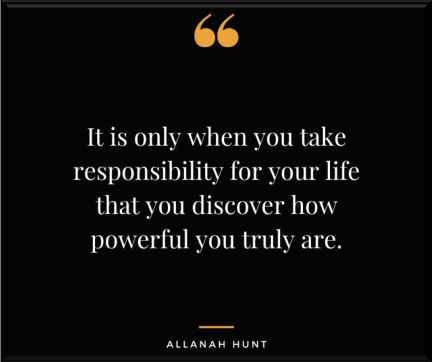
Instinct had now served its role as an initial guide to Lewis’s decision. He had a definite sense of which of his values, commitments, and responsibilities were in conflict. Now he needed further guidance.
Following the advice “Become who you are” involves learning who one has been. This means answering the second basic question: How deep are the moral roots of the conflicting values that are creating the right versus-right conflict? Tracing the “roots” of one’s values means understanding their origins, evolution, and importance in a person’s life.
Steve Lewis’s challenge was to try to understand which side of his dilemma had the deepest roots in his life. Although he had little time for reflection, he soon found himself thinking of earlier situations in his life when he had been singled out because of his race. These were, in effect, early defining moments, which he interpreted through his personal credo “Action over words.”
Although these moments were personal, they also reflected his family’s experiences. Among these, one incident stood out. In the early 1960s, his parents made a reservation at a restaurant that reputedly did not serve blacks. When they arrived, the hostess told them there had been a mistake, the reservation was lost, and they could not be seated, even though the restaurant was half empty. When they got home, his mother made a new reservation under her maiden name. The restaurant suspected nothing. When they returned there an hour later, the hostess, though hardly overjoyed, proceeded to seat them.
Events like these mean different things to different people, but what was important for Lewis is what they meant to him, in the few minutes available to make a decision. Steve Lewis was galvanized when he thought what his parents had done. Even now, years after the event, he felt angry, humiliated, and proud. He would view the situation as his parent’s son. He would also view it as an African American, not as just another young investment banker. He could not go to the meeting as a token black, because this would repudiate his parents’ example. He had decided, in effect, that this was a vital part of his moral identity, one with deeper and more complex connections to his past life than the professional role he had recently assumed.
Lewis had clarified his moral starting point. He had defined the basic conflict in terms of his personal values and responsibilities. He believed he knew which of these were connected most strongly to his past life. But were these the values he wanted to shape his future? This question remained unanswered. So, too, did the question of just what he should do; Lewis still lacked a plan of action.
THIS IS ‘MY’ WAY, WHERE IS YOURS?
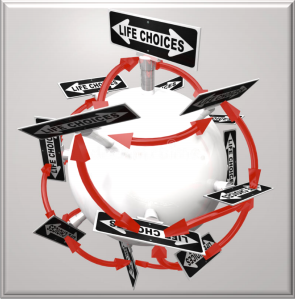
What do Nietzsche’s views of ethics suggest for people who, like Steve Lewis, face difficult issues of moral identity? Nietzsche’s basic question – What is your way? – urges people to look at critical choices, not simply as the culmination of their pasts, but as the first steps in the shaping of their future selves.
Nietzsche is emphatic on this point. He warns vigorously against defining a problem in terms of values that one has not embraced for oneself. People may, at times, need to be untrue to themselves – if their selves consist too much of others’ values.
Steve Lewis believed he was pursuing his own values in seeking to become a partner at a Wall Street investment bank. This was the life he wanted to live and a kind of work he knew he would enjoy doing. Moreover, this was an abiding dream and hardly a passing fancy. Since his sophomore year of college, Lewis had been fascinated by the idea of a career on Wall Street, and he had worked hard and purposely to make it possible.
When he accepted his current job, he had finally set foot on the path he had dreamed of for so long, and neither the long hours nor the detailed grunt work, which was the lot of first-year analysts, gave him misgivings about his choice. He loved the competitive, fast-paced world he had entered. Moreover, Lewis had little doubt that the dream was his. But his parents were concerned about his career choice. They did not think Wall Street was the most welcoming environment for a young African American. But this made the challenge even more compelling for Lewis.
To the question What is your way? Lewis had a firm answer. He had no doubt that he wanted to become a partner at a major investment bank. This realization intensified Lewis’s dilemma and clarified how high the stakes were for him. He would not betray his parents’ example, nor his personal interpretation of it: “Action over words.” These defined much of who he was. At the same time, he did not want to imperil a job and a career that defined much of what he hoped to become.
SEENG THE WORLD AS IT IS
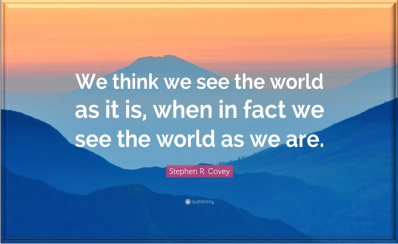
Another important moralist, Niccolo Machiavelli have much to say to Steve Lewis. However, there is the question of whether Lewis should listen to him. Machiavelli is, after all, the alleged high priest of untrammeled self-interest and duplicity. But would hundreds of books and articles still examine Machiavelli’s ideas if he simply advocated craftiness as a political tactic?
For Machiavelli, ethics and politics were matters of personal knowledge and wisdom derived from hands-on experience. He believed, above all else, that successful leaders must see the world as it really is. His masterwork titled The Prince, combines his analyses with examples of how successful leaders actually behaved.
If Machiavelli were looking over Lewis’s shoulder, he would likely tell him that his reflections and aspirations, however heartfelt, were the mere gossamer of youthful idealism. Machiavelli would call his attention to the hard realities of his situation, particularly the field of power and self-interest in which Lewis found himself. At best, Lewis had a single, minor bargaining chip: he could create a temporarily awkward situation, essentially an inconvenience, by saying no to the St. Louis presentation.
Playing this chip, however, was risky. The word on the street was that reputations were formed very early at his firm. The grapevine let the organization know who could make their numbers, who the team players were, and who really belonged on the fast track.
Machiavelli would quickly recognize the affirmative action game (or the policy of favoring individuals known to have been discriminated previously) that the firm and its clients were playing. Lewis was in the right place, at the right time, with the right skin color. If the client had been a white Yale graduate who loved golf, the firm would have sent one of its Yale golfers. But the game was a little tricky, perhaps even perilous, and Machiavelli would surely want Lewis to tally the risks and rewards.
Attending the meeting would let Lewis log some valuable “face time” with his bosses on the plane flight and before and after the meeting. He might improve his professional skills by watching the presentation. And, if his firm were chosen, Lewis could bask in the glow of success and perhaps even participate in follow-up work for the client.
But what if Lewis was embarrassed at the St. Louis meeting? He knew nothing about the project, which involved a highly specialized area of municipal finance. What if someone at the presentation asked him what part of the project he worked on or asked him a technical question about the deal? Would he bluff? What if he got in over his head and imperiled the deal? Another risk was resentment among the analysts and associates who were passed over even though they knew more about municipal finance. His firm was intensely competitive; would they try to trip him up later? In short, what little power Lewis had was awkward for him to use.
The Prince is Michiavelli’s advice to leaders on recognizing the realities of their situation and ways to gain, keep, and use power. Much of his guidance rests on this observation:
How one lives is so far distant from how one ought to live, that he who neglects what is done for what ought to be done, sooner effects his own ruin than his preservation, for a man who wishes to act entirely up to his professions of virtue soon meets what destroys him.
Machiavelli did not intend to endorse or praise timidity, short sightedness, business as usual, or the easy way out. He admired boldness, as long as shrewdness guided it. Hence, if Machiavelli were counseling Steve Lewis, his basic question would be: What combination of expediency and shrewdness, coupled with imagination and boldness, will move you closer to your personal goals.
WIGGLE ROOM
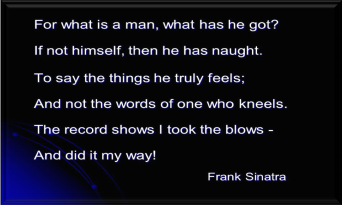
Where do the ideas of Aristotle, Nietzsche, and Machiavelli leave Lewis? Certainly not a formula or a grand principle for deciding what to do. Perhaps with a clearer sense of the personal stakes in this decision – the ways this decision will reveal, test, and shape his values and character. Perhaps also with an awareness of the importance of four questions:
- How do my feelings and instincts define the dilemma?
- Which of the responsibilities and values in conflict have the deepest roots in my life and in communities I care about?
- Looking to the future, what is my way?
- And how can expediency and shrewdness, along with imagination and boldness, move me toward the goals I care about most strongly?
These questions can also serve as practical criteria for devising a plan of action. Notice how the questions balance each other and limit the risks that each one, considered alone, might create. Taken by itself, for example, Machiavelli’s question could lead someone like Lewis to focus too heavily on what is expedient in the present moment. This tendency is balanced by Aristotle’s emphasis on the roots of one’s responsibilities in one’s life and community and by Nietzsche’s question – What is your way? – which draws attention to the future.
Lewis’s basic task was one that thoughtful people often face: pursuing the morally laudable quest for “wiggle room.” He needed to find a plan of action that would preserve the values he cared about without making him a noble, young, unnoticed martyr. Lewis decided to join the presentation team, but he also gambled that he could do so on terms that were at least acceptable to him. He told his colleagues that he felt honored to be asked but added that he wanted to play a role in the presentation. He said he was willing to spend every minute of the next 30 hours in preparation. When he was asked why this mattered, Lewis said nothing about how he was chosen, his reluctance to be used as a token black, or his personal philosophy of “Action over words.” All he said was that he wanted to earn his place on the team.
Lewis colleagues reluctantly agreed. There was, it turned out, a minor element in the presentation that required the application of some basic analytical techniques with which Lewis had worked. When Lewis stood up for the 12 minutes allotted him, he had a terrible headache and wished he had simply said no to the offer. His single day of cramming was no substitute for the weeks his colleagues had invested in the project. But his presentation apparently went well enough. He finally began to relax when he realized that no one had questions for him.
On the flight back, Lewis’s colleagues thanked him for helping out, especially on short notice. They never said anything about why Lewis had been chosen, and during the next few weeks no one said anything more about what he had done. Lewis was invited to the small party that was held when his firm was awarded the work.
On balance, Lewis was pleased and relieved about what he had done. He believed he had defined the dilemma soundly, in terms of his experience and values. And, on the whole, he resolved it without betraying his parents and himself by merely attending the meeting and serving a decorative function. At the same time, his career prospects may have been strengthened. He felt he had passed a minor test, a rite of passage at his firm, and demonstrated that he was willing to do what it took to get the job done. The white analysts and associates who were passed over probably did some grumbling, but Lewis suspected that, if they had been dealt his hand, they would have played their cards as he did.
Perhaps Lewis’s hands were a little dirty. He had not told his colleagues what he really thought, and he did participate in a charade, suggesting to the client that he had played a larger role than he actually did. And, from Aristotle’s perspective, he may have begun a habit of compromising his values in order to climb the greasy pole. This habit could someday culminate in a serious betrayal of his values. At times, Lewis wished he had said something or stood for his beliefs – and he hoped that he would do so on future occasions, once he had established himself. But, to do this, he felt he had to pick his battles.
As for Nietzche’s injunction, “Become who you are,” Lewis hoped he had taken a small step toward becoming an “ethically sensitive pragmatist.” Surely he had been pragmatic, as he and his parents had been in the past. He hoped that, at the same time, he had honored the values by which he hoped to shape his life.
CONCLUSION
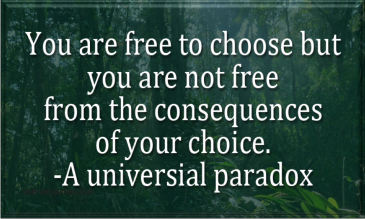
Only time would reveal the importance of this defining moment in Steve Lewis’s early professional years. But one thing is clear, he had made a defining personal choice of a crucial right-versus-right conflict in his life. He had written a paragraph of his personal and professional autobiography and his choice will form an important part of his life and career.
Did you enjoy this article? What topics on leadership do you want discussed next?


